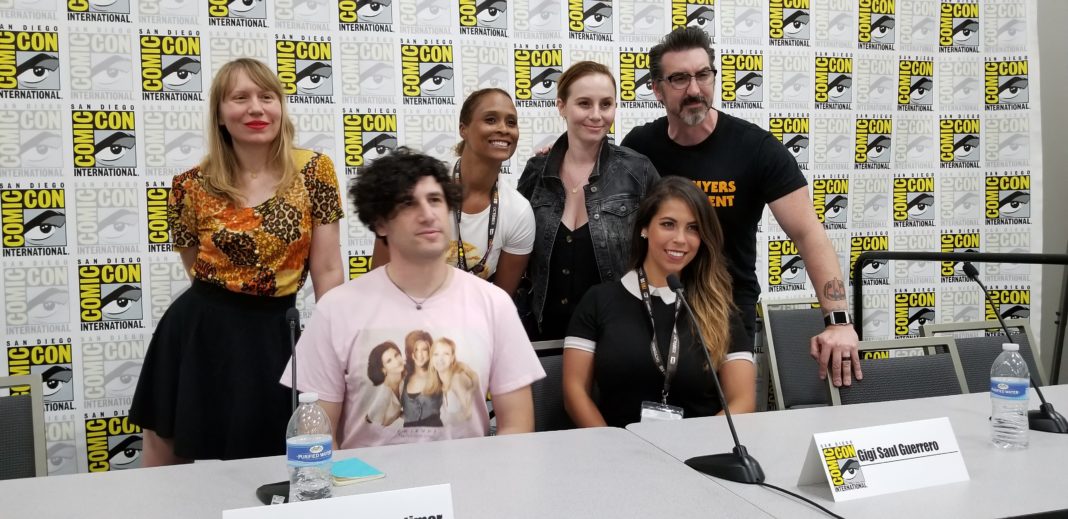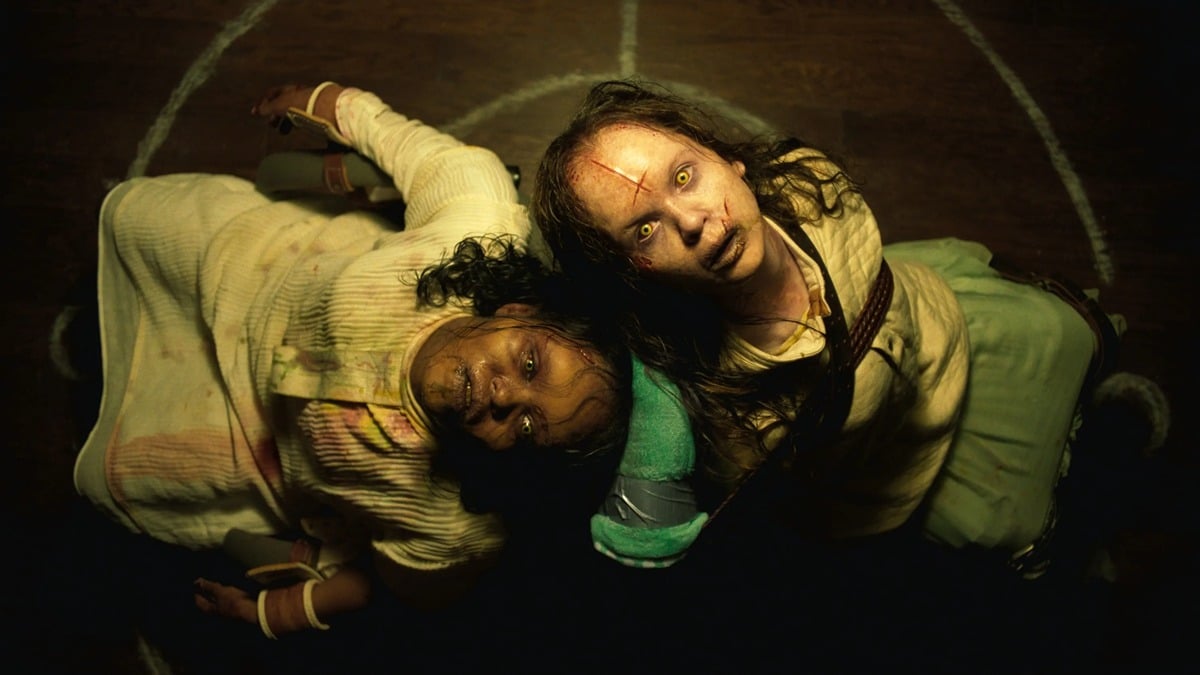By Gabriel Neeb
Moderated by film writer and podcaster Amy Nicholson, a panel discussing current trends in horror films — “Bold Voice of Contemporary Horror” — was held in the closing hours of the San Diego Comic-Con on Saturday. Assembled were horror filmmakers Mali Elfman (Fun Size Horror), Akele Cooper (writer, American Horror Story and The Nun sequel), Adam Egypt Mortimer (director, Daniel Isn’t Real), Gigi Saul Guerrero (Luchagore Productions), and Ryan Turek (VP Development at Blumhouse Pictures).
Nicholson began the panel by asking each panelist what was the last movie that scared them. Elfman is scared of everything and was impressed with the latest season of American Horror Story, Cooper was terrified by Hereditary, and Mortimer mentioned Gaspar Noe‘s Climax because it evolved from terrifying to the realization that this might have been Noe’s idea of what a slapstick comedy is. Guerrero was scared by Crawl, which caused her to spill her popcorn all over the theater, and Turek finished off this portion of the panel by citing Terrified from Argentina.
Delving further into contemporary horror, Nicholson asked what makes a film, well, contemporary. Turek took the lead on this by saying that themes and characters give a film that feel, especially if it can be accessed emotionally by a viewer. Guerrero said that now is a good time to be in horror as the market is receptive to new voices and ideas, and the movie Get Out has shown there is a desire for more horror films that address unspoken issues in a society as it has served to inspire her film, Culture Shock.
Mortimer stated that the best horror films of a given time are that way as they take the craft seriously, and that a lot of new talent is reflecting this and fueling a creative boom. Cooper took a different approach by citing the approach to tropes and clichés of horror movies haven become more known… and that has resulted in the creative attempt to subvert them, as in the HBO series Los Espookys. Elfman stated that even though effects are better, the emotional resonance of a work is what leads to the work’s success.
The panel then tripped over the fact that contemporary horror doesn’t even need to be horror by citing episodes of the series Chernobyl, which featured parts that had to be fast forwarded through.
Horror today is, among other things, rewarding unique perspectives. From a box office standpoint, theaters are filled with either Marvel blockbusters, or Crawl, Annabelle or Midsommar.
Turek underlined this point when he said, “I can’t watch dramas.”
Horror now has to break the mold of a world increasingly regulated by algorithms which attempt to define taste. Blumhouse Productions itself has made it acceptable for directors like David Gorson Green to do a film like 2018’s Halloween. and on the other end if the spectrum, producers like Ryan Murphy or James Wan are more interested in ideas that do not merely service a brand.
Guerrero was asked specifically about how she managed to work in themes which made people nervous. “Mexicans make people nervous,” was her response, and the script addressed the idea of the American Dream and its meaning, that she felt a need to build the script into something powerful and away from vanilla attitudes towards immigration.
At this point, a clip from Mortimer’s film Daniel Isn’t Real was played. Mortimer then spoke about how he views this as a piece of the cinema of anxiety and that it took seven and a half years to emerge.
Elfman’s Neurotica with Karen Gillan showed a clip, with Elfman speaking about how the film exists between laughter and tension.
The topic of nostalgia was brought into question by Nicholson, and it provoked the most division between Mortimer and Turek where one of them hated it, and one of them loved it. Mortimer suggested, jokingly, that this be resolved with a wrestling match.
Mortimer said he dislikes it, especially 1980s nostalgia as it regresses a viewer to childhood, and that the political slogan of “Make America Great Again” is simplistic nostalgia brought to horrifying reality. Turek seemed to like it since it allowed for the technology of today to be elided, which can be troublesome from a storytelling standpoint.
Cooper seemed to think this was unacceptable and wanted creators to accept the challenge and make the technology scary.
The panel continued on, discussing the influence of the hit Get Out which has had good effects and ill effects. Turek, in his role at Blumhouse, said he gets multiple Get Out mashup pitches. He stated that the film came from a place of anger and frustration on the part of Jordan Peele, and many of those pitches don’t have that origin. The better ideas that come to his office are from the things that frustrate the creators.
The final agreement from the panel was that horror is at a point where it is taken more seriously, and that audiences want things that are fresh and new. With that, clips from The Lodge, Villains, and Little Monsters — all original works of horror — were played, thus concluding the panel on contemporary horror.








Amy Nicholson is great. I love her podcast, “Unspooled.” Wish I could have been there.
Comments are closed.